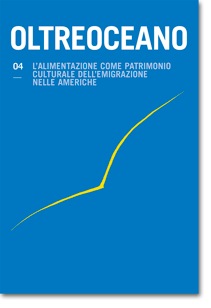Alimenti e bevande, metafore identitarie e solidali nell’opera di Mauricio Rosencof
Keywords:
immigrazione, contaminazione, cibo, ebrei polacchiAbstract
Il saggio ruota sulla vicinanza e solidarietà tra immigrati che comporta la contaminazione, la trasformazione del modo di cibarsi, che integra al suo interno diverse componenti, quelle originarie e quelle trovate nell’ambiente di accoglienza. Ne è un esempio Mauricio Rosencof, nato a Florida, in Uruguay, nel 1933, è figlio di ebrei polacchi, emigrati pochi anni prima in cerca di un futuro migliore.
Food and Drinks as Metaphors for Identity and Solidarity in the works of Mauricio Rosencof
This essay focuses on the closeness and solidarity among immigrants which comprises a contamination and transformation of eating habits based on the integration of various components from the old homeland and the new host country. An example is provided by the works of Mauricio Rosencof, who was born in Florida, Uruguay in 1933 from Polish Jewish parents who had emigrated there a few years earlier in search of a better future.
Downloads
References
Campodónico, M.Á. (2000): Las vidas de Rosencof. Montevideo: Fin de Siglo.
Forné, A. (2009): El desdoblamiento de identidades en El Bataraz de Mauricio Rosencof. Hipertexto, pp. 5-105.
Johansson, M.T. (2006): Palabra en sepultura. El Bataraz de Mauricio Rosencof. Persona y sociedad, XX, 2, pp. 177-189.
Rosencof, M. (1999): El bataraz. Montevideo: Santillana / Alfaguara.
Rosencof, M. (2004): El enviado del fuego. Montevideo: Santillana / Alfaguara.
Rosencof, M. (2005): Las cartas que no llegaron, 2000. Buenos Aires: Suma de Letras Argentina.
Rosencof, M. (2005): El barrio era una fiesta. Montevideo: Santillana / Alfaguara.
Rosencof, M. (2007): Una góndola ancló en la esquina. Montevideo: Santillana / Alfaguara.
Rosencof, M. (2009): Medio mundo. Montevideo: Santillana/Alfaguara.
Símini, D. (2008): La memoria dell’orrore come riscatto dell’umanità. In M. Rosencof, Le lettere mai arrivate (pp. 87-96). Firenze: Le Lettere.
Símini, D. (2008): Mauricio Rosencof, una vita e un’opera intense. Collettivo R & Atahualpa, 8-9 (nuova serie), pp. 57-59.
Símini, D. (2008): Comunità ed estraneità nella narrativa di Mauricio Rosencof. In C. Giorcelli & C. Cattarulla (Eds.), Lo sguardo esiliato. Cultura europea e cultura americana fra delocalizzazione e radicamento (pp. 411-422). Casoria: Loffredo.
Símini, D. (2009): Un gallo multicolore per un detenuto in isolamento. Proa Italia, 1, pp. 156-158.
Símini, D. (2009): Registri linguistici in El bataraz di Mauricio Rosencof. In G.L. De Rosa & A. De Laurentiis (Eds.), Lingue policentriche a confronto. Quando la periferia diventa centro (pp. 203-211). Milano: Polimetrica.
Downloads
Published
How to Cite
Issue
Section
License

This work is licensed under a Creative Commons Attribution-NonCommercial-ShareAlike 4.0 International License.
The authors undertake to comply with the following conditions, which are considered accepted at the time of submission of their contributions.
The sending of a text implies that it is unpublished and not submitted to be published elsewhere.
1. If accepted, the author shall confer on the publisher the right to publish and distribute it both in paper form and in the online electronic edition. The published articles will be downloadable and made available in open access.
2. Provided that it correctly indicates that the first publication took place in the journal Oltreoceano. Rivista sulle migrazioni the author has the right to: a) reproduce the article in separate extracts or collected in a volume; b) publish the article on their personal website or teaching site provided that these sites are of a non-commercial nature; c) deposit the article in online archives of a non-commercial nature, linked to the institution they belong to or as part of projects for the non-commercial dissemination and open access of scientific works.
The use of contributions by third parties, for commercial or otherwise unauthorized purposes, is not allowed. The publisher declines all responsibility for the unauthorized use of the material published in the journal.












